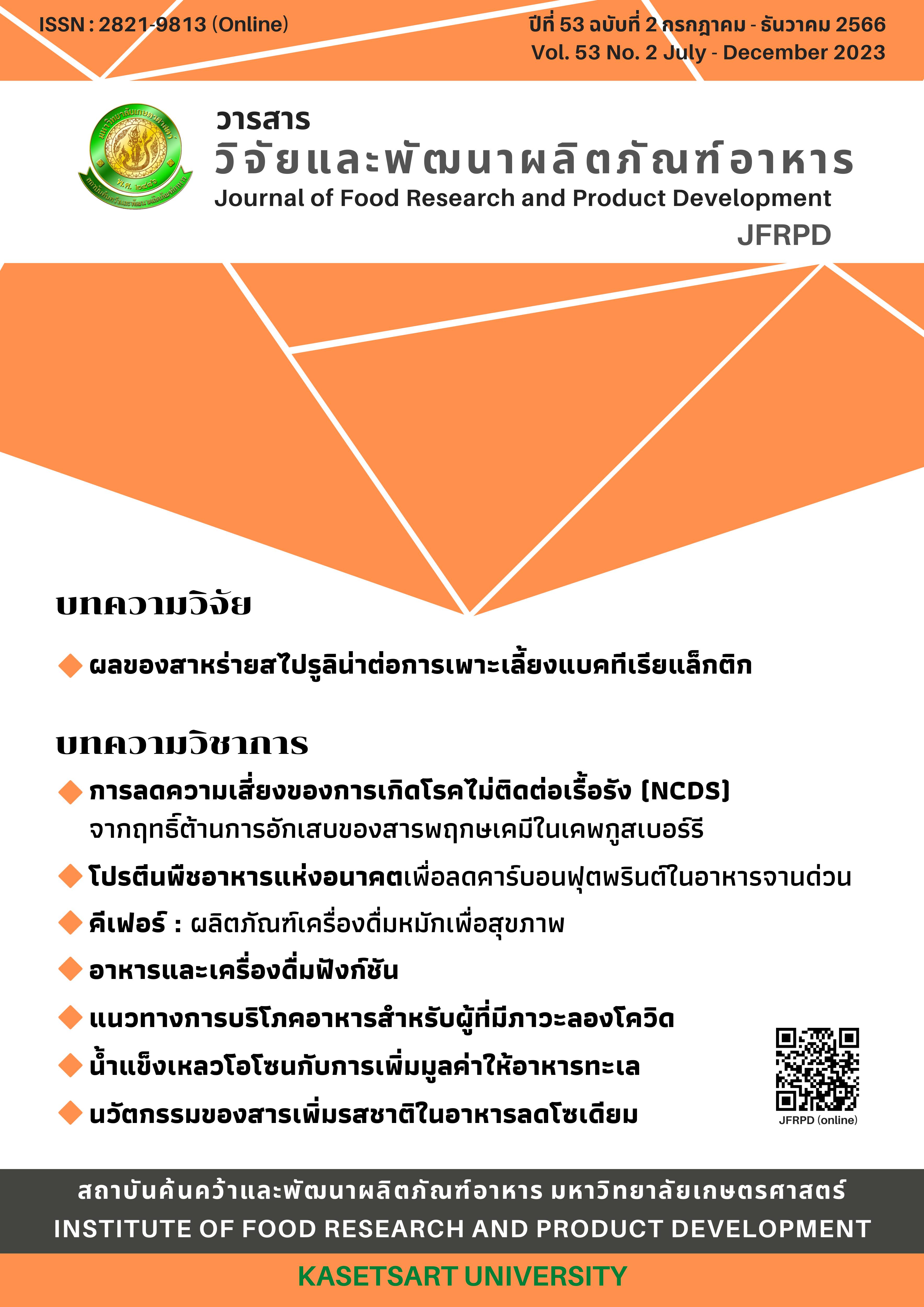แนวทางการบริโภคอาหารสำหรับผู้ที่มีภาวะลองโควิด Dietary recommendations for Long COVID-19
Main Article Content
Abstract
The COVID-19 affects lifestyle behavioral changes that can potentially impact health, both in the short and long term. For example, weight gain effect may increase the risk of obesity and cardiovascular diseases. Additionally, COVID-19 can directly affects nutrition by promoting inflammation, reducing nutrient intake, and absorption efficiency which can reduce the immune system and increase the risk of infection and severity of diseases. Even in those who have recovered from COVID-19, they still need to monitor their health as they may experience Long COVID, often accompanied by malnutrition, loss of body mass except fat, and underlying low grade inflammation. This article demonstrates many strategies for consuming bioactive substances, nutritional supplements, and the use of nutraceuticals to help counteract the effect of Long COVID.
Keywords : COVID-19, Long COVID-19, nutritional status, nutrients
บทคัดย่อ
การแพร่ระบาดของโรคติดต่อเชื้อไวรัสโคโรน่า 2019 (โควิด-19) ทำให้พฤติกรรมของมนุษย์มีความเปลี่ยนแปลงและส่งผลกระทบต่อสุขภาพทั้งในระยะสั้นและระยะยาว เช่น การมีน้ำหนักตัวเพิ่มขึ้น นำไปสู่ความเสี่ยงต่อการเกิดโรคอ้วนและความเสี่ยงของการเกิดโรคหลอดเลือดหัวใจ นอกจากนี้โควิด-19 สามารถส่งผลต่อภาวะโภชนาการโดยตรงผ่านการกระตุ้นให้เกิดภาวะอักเสบในร่างกาย การได้รับสารอาหารและประสิทธิภาพการดูดซึมสารอาหารลดลง ทำให้ระบบภูมิคุ้มกันบกพร่อง และเพิ่มความเสี่ยงของการติดเชื้อและความรุนแรงของโรคที่เพิ่มขึ้น ในผู้ที่หายจากการติดเชื้อโควิด-19 ก็ยังคงต้องติดตามอาการของตนเอง เนื่องจากอาจมีภาวะลองโควิด ซึ่งมักพบเจอร่วมกับการมีภาวะทุพโภชนาการ การสูญเสียมวลรวมของร่างกายยกเว้นส่วนไขมัน และมีภาวะการอักเสบแบบอ่อน (low grade inflammation) แฝงอยู่ในร่างกาย บทความนี้ชี้ให้เห็นถึงแนวทางการบริโภคอาหารที่มีสารออกฤทธิ์ทางชีวภาพ การเสริมสารอาหาร และการใช้โภชนเภสัชเพื่อช่วยต่อต้านภาวะลองโควิด
คำสำคัญ : โควิด-19 ภาวะลองโควิด-19 ภาวะโภชนาการ สารอาหาร
Downloads
Article Details
References
ทวิติยา สุจริตรักษ์. ประเด็นน่ารู้เกี่ยวกับไวรัส SARS-CoV-2: ไวรัสที่ก่อให้เกิดโรคโควิด-19. สมาคมโรคติดเชื้อในเด็กแห่งประเทศไทย. [อินเทอร์เน็ต]. [เข้าถึงเมื่อ 15 ส.ค. 2566] เข้าถึงได้จาก: https://pidst.or.th/A966.html
กรมควบคุมโรค. สถานการณ์ผู้ป่วย COVID-19 ภายในประเทศ. กระทรวงสาธารณสุข. [อินเทอร์เน็ต]. [เข้าถึงเมื่อ 30 มิ.ย. 2566] เข้าถึงได้จาก: https://ddc.moph.go.th/covid19-dashboard/
ภัทิรา ตันติภาสวศิน, สิทธิชัย ตันติภาสวศิน. ภาวะโพสท์โควิด (ลองโควิด). วารสารโรงพยาบาลชลบุรี 2565;47(1):67-84.
Cruzat V, Rogero MM, Keane KN, Curi R, Newsholme P. Glutamine: metabolism and immune function, supplementation and clinical translation. Nutrients. 2018;10(11):1-31.
Kelly B, Pearce EL. Amino assets: how amino acids support immunity. Cell Metab. 2020;32(2):154-75.
Bogdan C. Nitric oxide and the immune response. Nat Immunol. 2001;2(10):907-16.
Zhivaki D, Kagan JC. Innate immune detection of lipid oxidation as a threat assessment strategy. Nat Rev Immunol. 2022;22(5):322-30.
Kolazkowska E, Kubes P. Neutrophil recruitment and function in health and inflammation. Nat Rev Immunol. 2013;13(3):159-75.
Geiger R, Rieckmann JC, Wolf T, Basso C, Feng Y, Fuhrer T, et al. L-arginine modulates T cell metabolism survival and anti-tumor activity. Cell. 2016;167(3):829-42.
Girelli D, Marchi G, Busti F, Vianello A. Iron metabolism in infections: focus on COVID-19. Semin Hematol. 2021;58(3):182-7.
Lv Y, Chen L, Liang X, Liu X, Gao M, Wang Q, et al. Association between iron status and the risk of adverse outcomes in COVID-19. Clin Nutr. 2021;40(5):3462-9.
Propper RE. Smell/Taste alteration in COVID-19 may reflect zinc deficiency. J Clin Biochem Nutr. 2021;68(1):3.
Velthuis AJW, Worm SHE, Sims AC, Baric RS, Snijder EJ, Hemert MJ. Zn2+ inhibits coronavirus and arterivirus RNA polymerase activity in vitro and zinc ionophores block the replication of these viruses in cell culture. PLos Pathog. 2010;6(11) doi: 10.1371/JOURNAL.PPAT.1001176.
Upala S, Jaruvongvanich V, Wijarnpreecha K, Sanguankeo A. Hypomagnesemia and mortality in patients admitted to intensive care unit: a systematic review and meta-analysis. QJM. 2016;109(7):453-9.
Lotti S, Wolf F, Mazur A, Maier J. The COVID-19 pandemic: is there a role for magnesium? Hypotheses and perspectives. Magnes Res. 2020;33(2):21-7.
Mofrad MD, Djafarian K, Mozaffari H, Shab-Bidar S. Effect of magnesium supplementation on endothelial function: A systematic review and meta-analysis of randomized controlled trials. Atherosclerosis. 2018;273:98-105.
Wallace TC. Combating COVID-19 and building immune resilience: a potential role for magnesium nutrition? J Am Coll Nutr. 2020;39(8):685-93.
กรุณา วงษ์กระจ่าง. บทบาทของซีลีเนียมในระบบภูมิคุ้มกันของร่างกาย. วารสารอาหาร 2564;51(4):26-35.
Bermano G, Meplan C, Mercer DK, Hesketh JE. Selenium and viral infection: are there lessons for COVID-19? Br J Nutr. 2021;125(6):618-27.
Carfi A, Barnabei R, Landi F. Persistent symptoms in patients after acute COVID-19. JAMA. 2020;324(6):603-5.
Majeed M, Nagabhushanam K, Gowda S, Mundkur L. An exploratory study of selenium status in healthy individuals and in patients with COVID-19 in a south Indian population: the case for adequate selenium status. Nutritions. 2021:82. doi: 10.1016/J.NUT.2020.111053.
The vitamin D-antimicrobial peptide pathway and its role in protection against infection. Future Microbiol. 2009;4(9):1151.65.
Rak K, Bronkowska M. Immunomodulator effect of vitamin D and its potential role in the prevention and treatment of type 1 diabetes mellitus-a narrative review. Molecules. 2018;24(1) doi: 10.3390/MOLECULES24010053.
Baktasj V, Hosack T, Patel N, Shah S, Kandiah P, Abbeele KVD, et al. Vitamin D status and outcomes for hospitalized older patients with COVID-19. Postgrad Med J. 2021;97(1149):442-7.
Yeoh KY, Zuo T, Lui GCY, Zhang F, Liu Q, Li AY, et al. Gut microbiota composition reflects disease severity and dysfunctional immune responses in patients with COVID-19. Gut. 2021;70(4):698-706.
Tosato M, Ciciarello F, Zazzara MB, Pais C, Savera G, Picca A, et al. Nutraceuticals and dietary supplements for older adults with Long Covid-19. Clin Geriatr Med. 2022;(38)3:565-91.
Kroll JL, Werchan CA, Rosenfield D, Ritz T. Acute ingestion of beetroot juice increases exhaled nitric oxide in healthy individuals. PLos One. 2018;13(1) doi: 10.1371/JOURNAL.PONE.0191030.
Kuzniak VK, Paluszcak J, Szaefer H, Baer-Dubowska W. Betanin, a beetroot component, induces nuclear factor erythroid-2-related factor 2-mediated expression of detoxifying/antioxidant enzymes in human liver cell lines. Br J Nutr 2013;110(12):2138-49.
Volino-Souza M, Oliveira GV, Conte-Junior CA, Alvares TS. Covid-19 quarantine: impact of lifestyle behaviors changes on endothelial function and possible protective effect of beetroot juice. Front Nutr 2020;7 doi: 10.3389/FNUT.2020.582210.
Barrea L, Grant WB, Frias-Toral E, Vetrani C, Verde L, Alteriis GA, et al. Dietary recommendations for post-covid-19 syndrome. Nutrients. 2022;14(6) doi: 10.3390/NU14061305.

